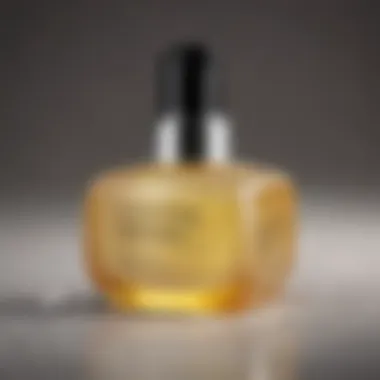The Impact of Sulfur on Acne Treatment Strategies


Intro
Acne is a common skin condition that affects people of all ages, leading to discomfort and distress. While numerous treatment options are available, sulfur has gained considerable attention for its potential effectiveness. Recognized for its therapeutic properties, sulfur is often included in many skincare formulations. The relevance of sulfur in acne treatment lies in its multifaceted nature, engaging in several mechanisms to combat acne effectively.
In this article, we will explore the essential characteristics of sulfur and its role in treating acne. We will discuss the benefits of sulfur-based products, the way they interact with skin, and practical considerations for usage. Additionally, we will outline various applications of sulfur in skincare, supported by expert opinions and current research findings. By the end of this exploration, readers will have a well-rounded understanding of sulfur's utility in managing acne, empowering them to make informed choices for their skincare routines.
Foreword to Acne
Acne is a common skin condition that affects individuals of almost all ages, particularly adolescents. It is not just a cosmetic issue; it can have significant emotional and social repercussions. Understanding acne is crucial for effective treatment and management strategies. This section explores the fundamentals of acne, from its biological underpinnings to its broader implications for those who suffer from it.
Understanding Acne
Acne occurs when hair follicles become clogged with oil, dead skin cells, and bacteria. This can lead to various forms of blemishes, ranging from mild comedones to severe cystic acne. The presence of acne indicates an imbalance in skin health that requires attention. Awareness of one’s skin condition promotes the adoption of appropriate skincare regimens and treatments.
Causes and Types of Acne
Hormonal Factors
Hormonal fluctuations play a significant role in acne development. Conditions such as puberty and menstruation can alter hormone levels, causing an increase in sebum production. This excess oil can clog pores, leading to acne lesions. It is a prevalent issue among women, especially during their menstrual cycles, making it crucial to understand these factors for managing outbreaks effectively.
Environmental Influences
Environmental factors such as pollution, humidity, and exposure to certain chemicals can also contribute to acne. Pollutants can lead to skin irritation and exacerbate existing conditions. Understanding these external influences helps individuals make informed choices regarding skincare products and lifestyle practices that minimize skin disruption.
Genetic Predisposition
Acne can also be hereditary. Individuals with a family history of acne are at a higher risk for developing the condition. This genetic aspect highlights the importance of understanding one’s background in managing acne. By identifying genetic patterns, one can anticipate potential outbreaks and explore more personalized treatment options.
Impact of Acne on Individuals
Emotional Effects
The connection between acne and emotional well-being is stark. Individuals suffering from acne often experience low self-esteem and body image issues. Chronic acne can lead to anxiety and depression. Understanding these emotional effects is essential when discussing treatment, as addressing mental health can be as important as treating the physical symptoms of acne.
Social Implications
Acne can impact social interactions. Individuals with visible acne may feel self-conscious, leading to avoidance of social situations. This hesitation can hinder one’s social development and affect relationships. Recognizing these social implications is vital for developing a supportive environment for those affected by acne.
Long-term Skin Changes
Long-term acne can result in significant changes to the skin. Scarring and discoloration are common consequences of persistent breakouts. These long-term changes can influence an individual’s future skincare choices and emphasize the importance of early and effective treatment strategies. Knowing that prevention is possible can empower individuals in their skincare journeys.
Sulfur: A Brief Overview
Sulfur plays a crucial role in skincare, particularly in acne treatment. Its unique properties make it effective in combating the factors that contribute to acne formation. Understanding sulfur's characteristics can help individuals make informed choices when it comes to their skincare routines. This overview highlights the significance of sulfur in managing acne, along with its historical context and chemical properties.
Chemical Properties of Sulfur
Sulfur is a non-metallic element with the atomic number 16. It is predominantly found in nature, especially in mineral deposits and as a component of various compounds. Soluble in alkaline solutions, sulfur has a distinct yellow color and pungent odor. Its importance in acne treatment stems from its antimicrobial and keratolytic properties.
- Antimicrobial: Sulfur helps to kill bacteria on the skin surface, which can cause acne flare-ups. This makes it a valuable ingredient for acne-prone individuals.
- Keratolytic: This property allows sulfur to promote exfoliation. It removes dead skin cells, reducing the likelihood of clogged pores.


Historical Use in Skincare
Historically, sulfur has been recognized for its beneficial properties in treating skin conditions. Ancient cultures utilized sulfur in various forms for its antiseptic qualities. For instance, the Romans often bathed in sulfur-rich mineral waters to treat skin ailments.
In modern times, sulfur’s application in acne treatment gained prominence in the 19th century with the advent of various sulfur-based medications. Many skincare products today, such as soaps and creams, incorporate sulfur to address acne. Its proven effectiveness and low irritation potential have solidified its place in skincare formulations. This combines both tradition and scientifically-backed benefits for users.
"Sulfur has been used for centuries in treating skin problems, showcasing its enduring relevance in dermatology."
Overall, sulfur remains a prominent element in contemporary acne treatment, meriting attention in discussions about effective skincare solutions.
Mechanisms of Sulfur in Treating Acne
Understanding the mechanisms by which sulfur contributes to acne treatment allows for a more informed approach to skincare regimens. Sulfur has distinctive properties that target several underlying causes of acne. This section will elaborate on how sulfur functions as an effective treatment option through its antibacterial properties, exfoliating action, and regulation of oil production.
Antibacterial Properties
Sulfur possesses notable antibacterial properties, making it an asset in combating acne. Acne is often exacerbated by bacteria such as Propionibacterium acnes, which thrive in the oily environment of clogged pores. Sulfur works effectively by inhibiting the growth of these bacteria.
When applied to the skin, sulfur can help reduce the bacterial load, which may contribute to fewer breakouts over time. Studies suggest that the application of sulfur-based products can lower inflammation and clear existing comedones. This antibacterial effect supports not only the prevention of new lesions but also the healing of existing ones. It's essential to choose sulfur products specifically formulated for acne treatment to maximize these benefits.
Exfoliating Action
Another critical mechanism of sulfur is its exfoliating action. Acne-prone skin often suffers from dead skin cell buildup that clogs pores, leading to breakouts. Sulfur encourages gentle exfoliation, helping to remove these dead cells. This action keeps the skin smoother and clearer.
Sulfur interacts with keratin, a primary protein in the skin, to help shed old skin and prevent the formation of clogged pores. Products like sulfur masks and creams can be effective for this purpose. The exfoliation process not only reduces acne occurrence but also enhances overall skin texture and tone. Regular use can result in visibly improved skin clarity and health.
Regulation of Oil Production
Excess oil production is another significant factor contributing to acne development. Sulfur assists in regulating sebum production, creating a less hospitable environment for acne-causing bacteria. By maintaining appropriate oil levels, sulfur helps reduce the glossiness often seen in oily skin types.
Specific sulfur formulations can help to balance oil production effectively. This regulation is paramount, as maintaining a balanced skin environment can prevent future breakouts and promote skin healing. It's advisable for individuals to look for treatments that not only contain sulfur but also target oil control for comprehensive care.
"Sulfur is not just an ingredient; its mechanisms play a vital role in maintaining clear skin."
In summary, the mechanisms of sulfur in treating acne are multifaceted and pivotal. Its antibacterial properties, exfoliating action, and oil regulation work synergistically to combat acne effectively. By understanding these mechanisms, individuals can implement sulfur into their skincare routines with clarity and purpose.
Benefits of Sulfur in Acne Treatment
Sulfur has gained recognition in the realm of skincare, particularly for its role in acne treatment. Understanding its benefits is essential for those seeking effective management of this common skin condition. This section explores the effectiveness of sulfur compared to other treatments and its minimal side effects, highlighting why it is increasingly recommended by dermatologists.
Effectiveness Compared to Other Treatments
Sulfur's antibacterial properties make it a formidable opponent against acne-causing bacteria. Unlike some conventional treatments that can disrupt the skin's natural barrier, sulfur works gently to eliminate bacteria without causing excessive dryness or irritation. Studies have shown that sulfur is effective in reducing acne lesions, often leading to improvements in skin clarity.
In comparison to benzoyl peroxide, a popular acne treatment, sulfur offers some distinct advantages. Benzoyl peroxide can cause irritation, and in some cases, allergic reactions that lead to further skin problems. Sulfur, however, has a reputation for being mild, making it suitable for sensitive skin. Furthermore, sulfur's ability to exfoliate helps in the removal of dead skin cells, further preventing clogged pores.
"Sulfur is an effective yet gentle treatment option for those struggling with persistent acne, especially for individuals with sensitive skin types."
Additionally, sulfur's regulation of oil production is a significant factor contributing to its effectiveness. By balancing the skin's oil levels, sulfur helps to prevent further breakouts, a common concern among acne sufferers.
Minimal Side Effects


One of the primary advantages of sulfur in acne treatment is its minimal side effects. Common treatments like retinoids may result in peeling and discomfort, creating a barrier for many users. Sulfur, on the other hand, rarely leads to such reactions. Most individuals tolerate sulfur-based products well, making them a more accessible option for those wary of potential irritation.
However, it is still important to perform a patch test before using sulfur products extensively. For those with allergies or sensitivities, even a natural ingredient like sulfur may cause a reaction. Thus, awareness and caution are advised, although adverse reactions remain infrequent.
Forms of Sulfur in Skincare Products
Understanding the various forms of sulfur utilized in skincare is crucial for those seeking effective acne treatment. Each form offers unique application methods and benefits, allowing individuals to choose what fits best for their skin needs. This knowledge enhances the overall approach to acne management, equipping users with information to make informed decisions.
Topical Treatments
Topical treatments are the most common way to apply sulfur for acne relief. These products can directly address the skin's surface, offering immediate benefits. Below are some popular types of topical treatments.
Sulfide Creams
Sulfide creams have a distinct composition that uses sulfur compounds to combat acne. One key characteristic is their ability to unclog pores while reducing inflammation. These creams are beneficial because they target bacteria on the skin, which can worsen acne. The unique feature of sulfide creams is their drying effect, which helps in controlling excess oil. However, they may cause dryness in some individuals, making proper moisturization essential after use.
Mask Treatments
Mask treatments containing sulfur provide a concentrated approach to treating acne. The significant aspect of these masks is that they often contain additional ingredients, such as clay, enhancing absorption and deep cleansing. Their popularity stems from their dual action; they not only target acne but also improve overall skin texture. One unique feature of mask treatments is their extended contact with the skin, allowing active ingredients to penetrate more effectively. Nevertheless, they should not be overused, as excessive use may lead to irritation or dryness.
Wash Products
Wash products that include sulfur offer a practical approach for daily skincare routines. The key characteristic of these products is their cleansing properties paired with the acne-fighting benefits of sulfur. These washes help to remove impurities and excess oil while preventing the formation of new breakouts. A unique feature of wash products is their ease of use, as they seamlessly integrate into regular cleansing routines. However, users should select formulations that do not strip the skin of its natural moisture.
Oral and Supplement Forms
Oral supplements containing sulfur are gaining attention for their systemic effects on skin health. While topical forms target localized issues, these supplements provide a broader approach. It is essential to consider the necessity of consulting with healthcare professionals before integrating these forms into one’s regimen, as individual needs and reactions can vary.
Application and Usage Guidelines
The section on application and usage guidelines is critical in the discussion of sulfur in acne treatment. Understanding how to properly incorporate sulfur into a skincare routine can maximize its benefits while reducing potential irritations. Many users may be eager to try sulfur for their acne, but without proper knowledge of its application, they may not achieve desirable results. Here, we will explore the best ways to use sulfur products and considerations for their frequency of use.
How to Incorporate Sulfur Products
Incorporating sulfur products into a skincare routine starts with selecting the right forms of sulfur available. Common forms are creams, gels, and masks, which target different levels of skin severity. When introducing a new product, it is wise to start with a small amount to assess individual skin tolerance.
- Patch Test
Before using any sulfur product extensively, conducting a patch test on a small area of skin is essential. This helps prevent adverse reactions. - Cleansing First
Always start with a clean face. Wash your skin with a gentle cleanser to remove dirt and oil. After drying, apply the sulfur product directly onto the affected areas. - Layering
If using multiple products, it is usually suggested to apply sulfur last after other treatments. This can help in allowing maximum potency of sulfur to act effectively on the skin. - Moisturizers
Following sulfur application, it may be beneficial to apply a non-comedogenic moisturizer. This prevents potential dryness that may occur from sulfur. - Regular Monitoring
Check skin reactions regularly after incorporation. If irritation occurs, gently reduce the frequency of use or consult with a dermatologist.
Frequency of Use
The frequency of using sulfur products is an essential part of maximizing their effectiveness in treating acne. However, the correct frequency can vary based on skin type and sensitivity. Beginners might find it best to start slowly to gauge their tolerance.
- For oily skin, using topical sulfur treatments two to three times a week may be beneficial.
- Those with sensitive skin may want to limit use to once or twice a week to avoid irritation.
- Combination skin might require a balanced approach by using sulfur on overly oily areas while applying gentler products elsewhere.
Understanding individual skin responses to sulfur can lead to better results. If you notice excessive dryness or irritation, it's crucial to reduce how often the product is applied and consider consulting a skin specialist.
"Use sulfur products thoughtfully. Observing your skin's response determines the best approach for treatment."
Educating oneself on proper application and frequency of sulfur use enhances its role as an effective acne treatment. Taking these steps can improve the user experience and outcomes positively.
Considerations and Precautions


When discussing the role of sulfur in acne treatment, it is paramount to examine the considerations and precautions that come into play. Although sulfur is a well-regarded component in skincare, proper usage is essential to avoid adverse effects. Knowledge about potential risks and how to mitigate them is crucial for individuals wanting to incorporate sulfur into their acne management routines. Missteps can lead to increased irritation or allergy reactions, which may off-set the benefits intended from using sulfur-based products.
Potential Allergies and Skin Reactions
Despite its efficacy, sulfur can provoke allergic reactions in some individuals. Symptoms may include redness, itching, and swelling at the application site. It is advisable to conduct a patch test before full application, particularly for individuals with sensitive skin or known allergies. A small amount of the product can be applied to an inconspicuous area, such as the inner arm. After 24 hours, observe for any adverse reaction.
Common allergens related to sulfur products include:
- Sodium lauryl sulfate
- Fragrance compounds
- Certain preservatives
If any of these symptoms occur, it is vital to cease use immediately and consult a dermatologist. The possibility of cross-reactivity with other ingredients should also be taken into consideration.
Consulting Professionals
Incorporating sulfur into skincare routines should not be done lightly. Consulting with a healthcare professional or dermatologist can provide tailored advice based on an individual's specific skin type and condition. Professional guidance ensures proper product selection and usage, reducing the risk of complications.
Dermatologists can also help in assessing the severity of acne and recommending alternative treatments if necessary. Some may find that other therapies, whether topical or systemic, may work better alongside or instead of sulfur.
"Individuals often overlook the importance of professional consultation prior to introducing new ingredients into their skincare regimes. This simple step can prevent unnecessary suffering from potential side effects."
Additionally, maintaining open communication with a healthcare provider allows for adjustments to treatment as the skin reacts. Regular check-ins can assist in optimizing the regimen, ensuring the focus remains on safe and effective acne management.
Current Research and Future Directions
The exploration of sulfur's role in acne treatment is not a concluded chapter; rather, it is a field ripe for ongoing research and inquiry. Understanding current trends and studies is crucial, as these findings could impact future skincare products, guidelines, and treatments. This section examines emerging studies and innovations tied to sulfur in skincare.
Emerging Studies
Recent studies have fueled interest in sulfur's efficacy beyond traditional uses. Researchers have conducted multiple trials aiming to investigate the full impact of sulfur treatments on acne. Notable studies have focused on its anti-inflammatory properties, suggesting that sulfur may reduce swelling and redness associated with acne lesions. Additionally, sulfur's role in normalizing skin cell turnover is under scrutiny. By preventing clogged pores, sulfur could play a critical role in reducing acne breakouts over time.
Furthermore, studies comparing sulfur to other common ingredients, such as benzoyl peroxide and salicylic acid, are promising. Many findings hint at sulfur’s comparable effectiveness, without the harsh side effects often attributed to these alternatives. This information can potentially position sulfur as a first-line treatment for individuals with sensitive skin.
Innovations in Sulfur Products
The skincare market is witnessing notable innovations in sulfur-based products. New formulations incorporate sulfur in combinations with other beneficial ingredients, such as zinc and niacinamide, creating synergistic effects. These combinations not only target acne but also address oily skin and other related concerns.
Moreover, advancements in delivery systems are improving the potency of sulfur treatments. For instance, encapsulation techniques allow sulfur to be released slowly over time, which can enhance its effects and minimize irritation. Products utilizing these advanced formulations include topical gels and cleansing foams.
"The future of sulfur in skincare is marked by a blend of tradition and innovation. As more studies validate its benefits, we can expect a surge in research-driven products."
In summary, as emerging studies highlight sulfur's potential and innovations reshape product offerings, there is a strong indication that sulfur will play a significant role in the future of acne treatments. The ongoing research landscape will undoubtedly influence how consumers understand and utilize sulfur in their skincare routines.
Culmination
In the realm of skincare, particularly in the treatment of acne, the discussion of sulfur plays a crucial role. Understanding how sulfur functions is not only important for individuals seeking solutions but also provides essential insights into the broader context of acne management. This article has delved deeply into sulfur's properties, mechanisms, benefits, and the various forms it takes in skincare products. By synthesizing this information, we aim to guide our readers in making informed decisions about their skincare regimens.
Summary of Key Points
Throughout this article, several key points about sulfur's role in acne treatment emerged:
- Chemical Properties: Sulfur is an essential element with unique antibacterial and antifungal properties, making it effective against acne-causing bacteria and excess oil.
- Mechanisms of Action: The antibacterial properties, exfoliating action, and regulation of oil production position sulfur as a potent ingredient in acne treatments.
- Product Forms: Sulfur can be found in various forms, including topical treatments such as creams, masks, and cleansers, as well as in oral supplementation.
- Benefits: Compared to other treatments, sulfur is often seen as effective with minimal side effects, making it a favorable option for many individuals.
- Considerations: While sulfur is generally safe, potential allergies and skin reactions should be monitored, necessitating professional consultation for personalized treatment approaches.
Final Thoughts on Sulfur in Acne Treatment
Sulfur's role in acne treatment is both profound and essential, as highlighted in this article. Its multifaceted nature allows it to address various acne-related issues efficiently. As individuals become more aware of their skincare choices, understanding the specific benefits of sulfur can empower them to optimize their acne management strategies. Furthermore, ongoing research may reveal even more innovative uses for sulfur in skincare, suggesting its relevance will continue well into the future.
In summary, sulfur stands as a valuable component in the fight against acne. Its application in skincare products offers a well-rounded approach to treating this persistent condition, making it worth consideration for anyone grappling with acne.







